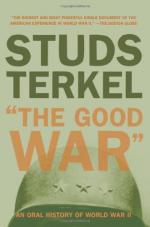
|
| Name: _________________________ | Period: ___________________ |
This test consists of 5 multiple choice questions, 5 short answer questions, and 10 short essay questions.
Multiple Choice Questions
1. What does Dellie Hahne say was the duty of young women during the war?
(a) To dance with soldiers at the USO.
(b) To plant victory gardens.
(c) To sew bandages.
(d) To recycle and conserve energy.
2. What causes the disease of beriberi, that stops kidney function?
(a) Lack of protein.
(b) Lack of Vitamin C.
(c) Lack of potassium.
(d) Lack of Vitamin B1.
3. Why did Robert Rasmus believe the Americans should be grateful to the Russians?
(a) The Russians diverted the German army.
(b) The Russians opened the door for the American invasion.
(c) The Russians were their comrades and allies.
(d) The Russians did the lion's share of the fighting.
4. Which city suffered the highest death toll from American bombing?
(a) Dresden.
(b) Tokyo.
(c) Nagasaki.
(d) Hiroshima.
5. How did John Ciardi feel about the dropping of the atomic bomb?
(a) He had no further reason to live.
(b) He had regained faith in his country.
(c) He had lost the lottery.
(d) He had won the lottery.
Short Answer Questions
1. What does Peter Ota tell us is worse than death in Japanese culture?
2. What does the classification 4E mean to a soldier?
3. What did Sarah Killingsworth believe the war offered to her and her family?
4. What unusual food did Maurice Wilson eat in the Philippines?
5. Why did Mike Royko spent nights in a pitch-black apartment as a child during the war?
Short Essay Questions
1. How did Robert Lekachman and E.B. Sledge feel about their efforts in the war?
2. What was the difference between the fate of Russian prisoners of war and American and British POWs?
3. What happened to the Allied prisoners of war in Germany after the war?
4. Why did E.B. Sledge believe American soldiers in the Pacific had lost all sense of decency?
5. What did Peter Ota say was different about Japanese-American culture before the war?
6. According to Admiral Gene Larocque, what were the negative long-range effects of WWII within the United States?
7. How did the war affect college-aged men?
8. How did Bill Bailey run afoul of the law?
9. How does Sarah Killingsworth feel now about the war?
10. How does Urusula Bender say the war was different for children?
|
This section contains 934 words (approx. 4 pages at 300 words per page) |

|




